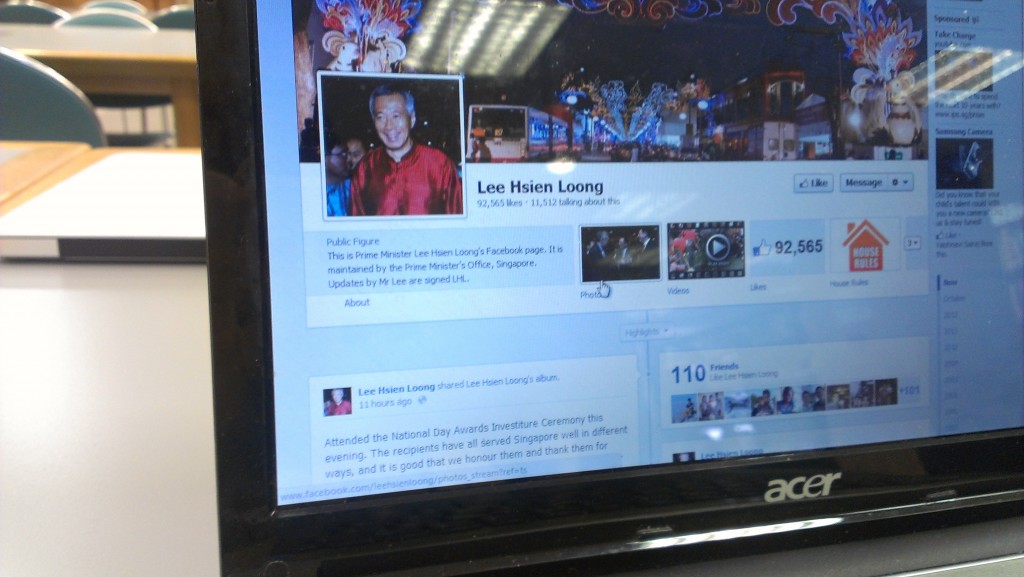According to the results of a recent poll conducted by the NUS Students’ Political Association (NUSPA), the government seems to have problems trying to reach out to tertiary students in the changing media landscape where use of social media is on the rise.
The poll of 407 undergraduates in Singapore showed that about 44.7% of those polled “hardly ever” while another 18.2% have “never” visited the Facebook pages of politicians. PM Lee Hsien Loong and Minister for National Development, Khaw Boon Wan, were the top 2 Ministers perceived to be using new media the “most effectively”, according to the poll.

At the time of writing, PM Lee’s official Facebook page has 91,867 “likes” while Mr. Khaw Boon Wan has 5,312 “likes”. In contrast, Ms. Nicole Seah, a politician from the National Solidarity Party, contested and lost in the 2011 Singapore General Elections (GE) but still has 105,793 “likes”.
Facebook “likes” are notoriously bad indicators of the amount of support that the person has because users need to “like” the page before gaining access rights to post or comment. Those that “like” the page can express support or disagreement making it difficult to gauge a politician’s popularity just based on the number of “likes”. However, it is nevertheless an indicator as to how many people are willing to engage with the politicians on social media. The fact that our Prime Minister has fewer “likes” than an unelected politician speaks volumes about the effective outreach of the government in the online realm.
The poll of 407 undergraduates in Singapore showed that about 44.7% of those polled “hardly ever” while another 18.2% have “never” visited the Facebook pages of politicians.
The poll also shows that social media seems to be “more influential” in the perception of Worker’s Party (WP) politicians (144 votes) than in the perception of the People’s Action Party (PAP) politicians (84 votes). Majority said that the state of current policies were more influential than social media in the perception of PAP politicians.
Politicians are also slowly coming to the realization that Facebook is not the only social media platform for engagement. Worker’s Party Politician and Aljunied GRC MP, Mr. Chen Show Mao, for example, runs a Twitter account (@ChenShowMao) with more than 6000 followers. Some commentators also argue that Instagram, a popular photo-sharing service, played a significant role during the 2012 U.S. Presidential elections.
In a speech made at the first session of the 12th Parliament, Dr. Yaacob Ibrahim, Minister for Communications and Information, acknowledged that “the Government recognizes social media as a valuable platform that agencies can use to directly engage with individuals and interest groups, and get more people connected on collaborative projects.”
Valerie Ng, President of NUSPA, said, “I think that successful engagement anywhere, and not just on social media sites, would have to start with government efforts to make youths interested in governmental issues, and also to instil the idea that government issues actually do have direct impact on the lives of these youths before they actually even want to be engaged by the government.”
Recognising the potential of social media in engaging citizens is one thing but actually using it successfully is a whole different matter altogether. There are many issues in Singapore that the government needs to engage the youth in such as education and national service and social media promises to be a key platform for engagement. While the relatively small sample size makes the results of the poll inconclusive, it is probably a good reminder that the Government should look into stepping up their engagement efforts with young Singaporeans through social media. Could the next electoral battleground play out more prominently on social media? The results of the 2016 General Elections will be telling.
Valerie Ng, President of NUSPA, said, “I think that successful engagement anywhere, and not just on social media sites, would have to start with government efforts to make youths interested in governmental issues,”
—————————————————


